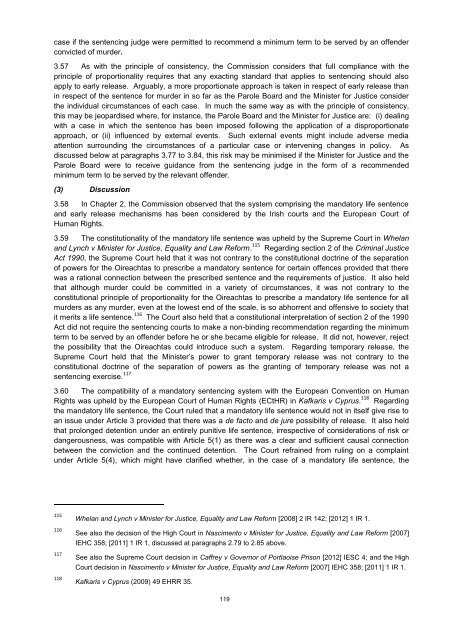Report on Mandatory Sentences - Law Reform Commission
Report on Mandatory Sentences - Law Reform Commission
Report on Mandatory Sentences - Law Reform Commission
Create successful ePaper yourself
Turn your PDF publications into a flip-book with our unique Google optimized e-Paper software.
case if the sentencing judge were permitted to recommend a minimum term to be served by an offender<br />
c<strong>on</strong>victed of murder.<br />
3.57 As with the principle of c<strong>on</strong>sistency, the Commissi<strong>on</strong> c<strong>on</strong>siders that full compliance with the<br />
principle of proporti<strong>on</strong>ality requires that any exacting standard that applies to sentencing should also<br />
apply to early release. Arguably, a more proporti<strong>on</strong>ate approach is taken in respect of early release than<br />
in respect of the sentence for murder in so far as the Parole Board and the Minister for Justice c<strong>on</strong>sider<br />
the individual circumstances of each case. In much the same way as with the principle of c<strong>on</strong>sistency,<br />
this may be jeopardised where, for instance, the Parole Board and the Minister for Justice are: (i) dealing<br />
with a case in which the sentence has been imposed following the applicati<strong>on</strong> of a disproporti<strong>on</strong>ate<br />
approach, or (ii) influenced by external events. Such external events might include adverse media<br />
attenti<strong>on</strong> surrounding the circumstances of a particular case or intervening changes in policy. As<br />
discussed below at paragraphs 3.77 to 3.84, this risk may be minimised if the Minister for Justice and the<br />
Parole Board were to receive guidance from the sentencing judge in the form of a recommended<br />
minimum term to be served by the relevant offender.<br />
(3) Discussi<strong>on</strong><br />
3.58 In Chapter 2, the Commissi<strong>on</strong> observed that the system comprising the mandatory life sentence<br />
and early release mechanisms has been c<strong>on</strong>sidered by the Irish courts and the European Court of<br />
Human Rights.<br />
3.59 The c<strong>on</strong>stituti<strong>on</strong>ality of the mandatory life sentence was upheld by the Supreme Court in Whelan<br />
and Lynch v Minister for Justice, Equality and <strong>Law</strong> <strong>Reform</strong>. 115 Regarding secti<strong>on</strong> 2 of the Criminal Justice<br />
Act 1990, the Supreme Court held that it was not c<strong>on</strong>trary to the c<strong>on</strong>stituti<strong>on</strong>al doctrine of the separati<strong>on</strong><br />
of powers for the Oireachtas to prescribe a mandatory sentence for certain offences provided that there<br />
was a rati<strong>on</strong>al c<strong>on</strong>necti<strong>on</strong> between the prescribed sentence and the requirements of justice. It also held<br />
that although murder could be committed in a variety of circumstances, it was not c<strong>on</strong>trary to the<br />
c<strong>on</strong>stituti<strong>on</strong>al principle of proporti<strong>on</strong>ality for the Oireachtas to prescribe a mandatory life sentence for all<br />
murders as any murder, even at the lowest end of the scale, is so abhorrent and offensive to society that<br />
it merits a life sentence. 116 The Court also held that a c<strong>on</strong>stituti<strong>on</strong>al interpretati<strong>on</strong> of secti<strong>on</strong> 2 of the 1990<br />
Act did not require the sentencing courts to make a n<strong>on</strong>-binding recommendati<strong>on</strong> regarding the minimum<br />
term to be served by an offender before he or she became eligible for release. It did not, however, reject<br />
the possibility that the Oireachtas could introduce such a system. Regarding temporary release, the<br />
Supreme Court held that the Minister’s power to grant temporary release was not c<strong>on</strong>trary to the<br />
c<strong>on</strong>stituti<strong>on</strong>al doctrine of the separati<strong>on</strong> of powers as the granting of temporary release was not a<br />
sentencing exercise. 117<br />
3.60 The compatibility of a mandatory sentencing system with the European C<strong>on</strong>venti<strong>on</strong> <strong>on</strong> Human<br />
Rights was upheld by the European Court of Human Rights (ECtHR) in Kafkaris v Cyprus. 118 Regarding<br />
the mandatory life sentence, the Court ruled that a mandatory life sentence would not in itself give rise to<br />
an issue under Article 3 provided that there was a de facto and de jure possibility of release. It also held<br />
that prol<strong>on</strong>ged detenti<strong>on</strong> under an entirely punitive life sentence, irrespective of c<strong>on</strong>siderati<strong>on</strong>s of risk or<br />
dangerousness, was compatible with Article 5(1) as there was a clear and sufficient causal c<strong>on</strong>necti<strong>on</strong><br />
between the c<strong>on</strong>victi<strong>on</strong> and the c<strong>on</strong>tinued detenti<strong>on</strong>. The Court refrained from ruling <strong>on</strong> a complaint<br />
under Article 5(4), which might have clarified whether, in the case of a mandatory life sentence, the<br />
115<br />
116<br />
117<br />
118<br />
Whelan and Lynch v Minister for Justice, Equality and <strong>Law</strong> <strong>Reform</strong> [2008] 2 IR 142; [2012] 1 IR 1.<br />
See also the decisi<strong>on</strong> of the High Court in Nascimento v Minister for Justice, Equality and <strong>Law</strong> <strong>Reform</strong> [2007]<br />
IEHC 358; [2011] 1 IR 1, discussed at paragraphs 2.79 to 2.85 above.<br />
See also the Supreme Court decisi<strong>on</strong> in Caffrey v Governor of Portlaoise Pris<strong>on</strong> [2012] IESC 4; and the High<br />
Court decisi<strong>on</strong> in Nascimento v Minister for Justice, Equality and <strong>Law</strong> <strong>Reform</strong> [2007] IEHC 358; [2011] 1 IR 1.<br />
Kafkaris v Cyprus (2009) 49 EHRR 35.<br />
119
















